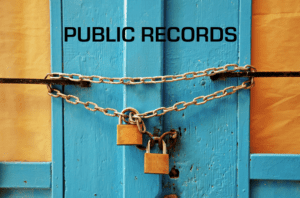 Accessing public records may seem daunting to many of us and rightfully so. Not only do public records laws vary widely between states, sometimes even finding the right portal to submit the request seems like a journey of its own.
Accessing public records may seem daunting to many of us and rightfully so. Not only do public records laws vary widely between states, sometimes even finding the right portal to submit the request seems like a journey of its own.
Over the past two months, I’ve spent dozens of hours filing requests for healthcare data, a new regulatory subject we’re adding to Violation Tracker, our database tracking corporate misconduct.
In honor of Sunshine Week—that time of year when we draw attention to the vital need for government transparency—let me share what I’ve learned from all 50 states.
Some states have their case data posted on their websites to be downloaded or scraped (thank you, California, with your over 5,000 entries!). Other states required manual entry of cases which was slightly more tedious but at least transparent. No records requests even needed to be filed.
Once those were finished, I turned to states where this information was not readily available: the other 40.
A handful of states responded in a timely manner with the information I requested, but they were in the minority. For the rest, I juggled between incorrect referrals, denials, sky high-cost estimates, and other barriers to supposedly public documents.
Some responders showed confusion, sending me to the wrong agencies. It didn’t matter how many times I used the word “state” in the prompt, I would get a referral to the federal Centers for Medicare & Medicaid Services (CMS), an agency already included in Violation Tracker. I would explain the difference, only to be met with silence in response.
In some cases, I was caught in a revolving door of state agencies. Mississippi, for example, continued to shuffle me between the Department of Health and the Division of Medicaid. When I reached out to the regional CMS office for assistance, I got disconnected phone numbers and email bounce-backs.
Another popular misreferral was to a database called Quality, Certification and Oversight Reports (QCOR) maintained by CMS. Data from suppliers and providers of Medicare and Medicaid services are posted to this site on a regular basis. While well-intentioned, the structure of the data is not specific. Penalties are only given in “total” and “average” amounts, ignoring the individual penalty amounts for any given corporation.
Agency officials didn’t seem concerned that this aggregated information is of little value to the public (and not what I was asking for). In their minds, the request had been fulfilled.
Outright denials were normally for one of two reasons: I don’t live in the state or the records don’t exist.
The first is an insult to anyone concerned with transparency, especially considering the allowance of proxies to file in some of these states.
Many state transparency laws only require disclosure of existing records; there is no requirement to create new records. In one instance, Nebraska sent a cost estimate of over $3,000 for 93 hours of labor to “find, scan, and electronically compile” the necessary documents. But their website has the exact records I was looking for—in PDF form and downloadable. The problem was that the information posted only goes back three months. Why would it cost thousands of dollars to access documents that already exist? I sure hope Cornhuskers don’t “shred” documents the second they take them off the website because that would be a real transparency and accountability issue.
And finally, in 2023, Rhode Island is still requiring open records requests to be mailed or faxed. As in, with a postage stamp or a machine that transmits paper documents even though we can do that electronically via a wonderful advancement we know as email.
This leaves us asking: why are public records so difficult to obtain?
State-run and licensed healthcare agencies have significant responsibility to the communities they serve. It should not take months of filing records requests to learn the extent to which they’re being disciplined for some type of misbehavior.
Around 10 states made tracking down that information easy, proving it can be done. We hope other states will follow suit.